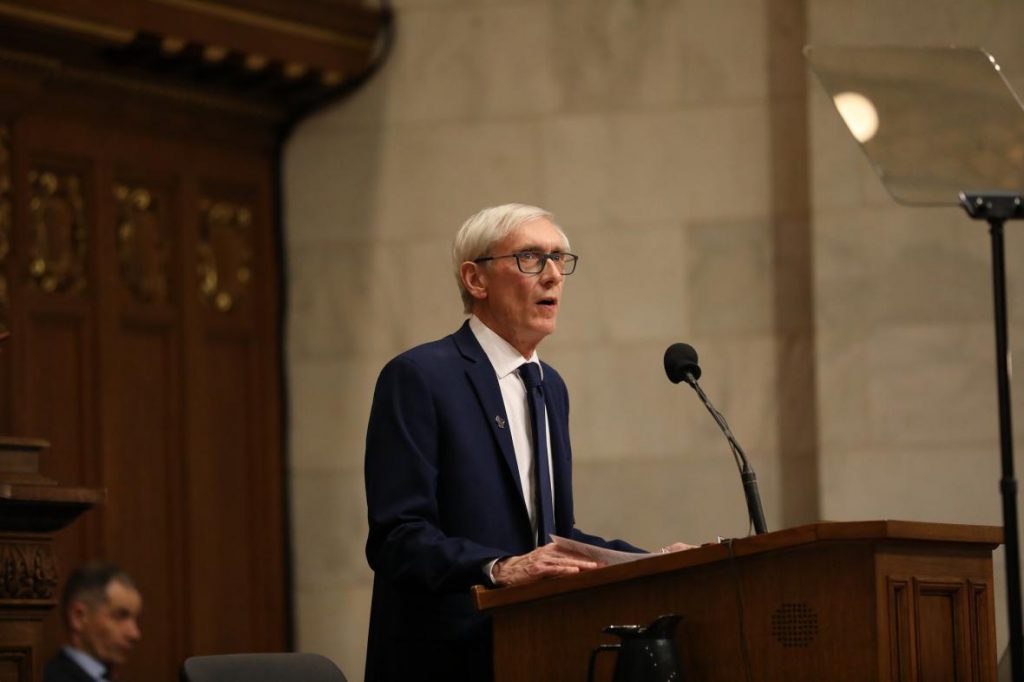Evers Budget Targets Rich Taxpayers
And helps middle class. But Republicans oppose plan.

Gov. Tony Evers gives his first State of the State address in Madison, Wisconsin, at the state Capitol building on Jan. 22, 2019. Photo by Emily Hamer/Wisconsin Center for Investigative Journalism.
The official summary of the state budget proposed by Democratic Gov. Tony Evers justifies its historical changes in the tax structure this way: “To create a fairer Wisconsin tax code, the Governor also recommends limiting special tax benefits for a small group of higher-income earners.”
That’s a Democratic version of an argument Scott Walker, as Republican candidate for governor, made during his first campaign in 2010.
Walker called public employees the “haves,” because they had collective bargaining power and paid too little for health care and pensions, and all other taxpayers the “have nots.”
The argument worked for Walker, who won the first of two terms. He got Republican legislators to end collective bargaining for most public employees and made public employees pay more for pensions and health care.
Eight years late, Evers started a new “haves” versus “have nots” debate, saying the richest taxpayers don’t pay enough for critical state services.
Still, the “haves” versus “have nots” argument made by the first Democratic governor in eight years is worth examining. How would Evers treat the “haves”?:
*Limit their “capital gains” deductions: Evers wants the capital-gains tax break to be claimed by only those with taxable incomes of up to $100,000 (single taxpayers) or $150,000 (married couples). That change would cost highest-income taxpayers $505 million over two years.
*Limit a tax break claimed by “manufacturers”: Republicans enacted a new tax break for farmers and manufacturers, saying it would create jobs. But, Evers aides say 81 percent of that tax credit in 2017 “went to taxpayers with adjusted gross incomes in excess of $1 million.” Limiting that tax break to manufacturers who make products worth more than $300,000 brings in $516 million more over the next two years.
What changes does Evers want for the “have nots”?
*Tax credit for middle-income taxpayers: The Family and Individual Reinvestment (FAIR) credit could be claimed by individuals with taxable incomes of up to $100,000 and couples with taxable incomes of up to $150,000. It would provide $832 million in tax cuts over two years, Evers aides say.
*Restore cuts in the Earned Income Tax Credit: The credit is a tax break for low-income residents who don’t owe income taxes. Evers says this change would give almost 200,000 households with children $53 million over two years.
*Expand the Homestead Tax Credit now claimed by the elderly and disabled: Allowing any taxpayer with an income of up to $30,000 to claim this credit would allow 160,000 new households to claim it and provide $38.9 million more for them.
*New tax credit for first-time homebuyers: If it became law, individuals could deduct up to $5,000, and couples up to $10,000, per year to help buy a first home. It would save them an estimated $4.1 million a year.
But Todd Berry, now retired after analyzing decades of state budgets as president of the non-profit Wisconsin Taxpayers Alliance, described those changes as “kind of a mess.”
Berry praised expanding Homestead and Earned Income credits, but called limiting the capital gains tax break “silly – another needless complexity.”
“If (state officials) don’t want special treatment of capital gains, tax it all as ordinary income and drop the marginal rates,” he explained.
Berry also criticized limiting the Manufacturing and Agriculture Credit: “If they don’t like it, better to get rid of it and recycle the money with lower tax rates for all businesses. End the picking-and-choosing of favorites.”
Overall, Berry concluded, the Evers tax-code changes have no chance to become law, so they “poke sticks in peoples’ eyes for, apparently, the sake of it.”
Responding to Berry, Evers aide Melissa Baldauff said the governor’s FAIR income tax cut would save the median-income family of four more than $1,000 over two years.
To pay for that, she added: “The governor limits tax provisions that benefit a narrow sliver of taxpayers…Those who claim these preferences in large amounts essentially enjoy an alternative income tax system where they pay much lower effective rates than people with ordinary wage and salary income. That isn’t fair.”
Steven Walters is a senior producer for the nonprofit public affairs channel WisconsinEye. Contact him at stevenscotwalters@gmail.com
The State of Politics
-
RNC Brings Fame to Gen Z Party Leader
 Jul 15th, 2024 by Steven Walters
Jul 15th, 2024 by Steven Walters
-
Wisconsin’s Republican Roots Run Deep
 Jul 8th, 2024 by Steven Walters
Jul 8th, 2024 by Steven Walters
-
Feuding Supreme Court Justices Need a Break
 Jul 1st, 2024 by Steven Walters
Jul 1st, 2024 by Steven Walters





















